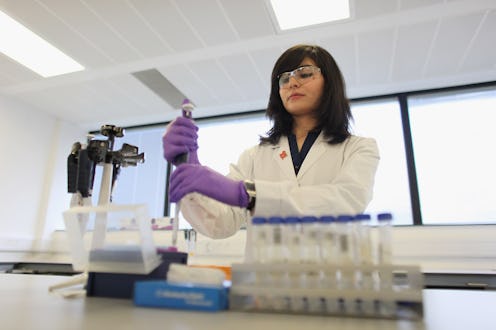Life
Is This The Most Sexist Peer Review Ever? Probably
Sexism is so insidious that sometimes it can be difficult to explain exactly why something is sexist. But then there are times when it's just very apparent — like if you are, say, a female scientist told you should team up with a man in order to make your study better. And yes, that really happened. In the year 2015. Sigh.
This all started when Fiona Ingleby and Megan Head, an evolutionary geneticist and evolutionary biologist respectively, submitted a scientific paper to the journal PLOS One. The paper was ultimately rejected by the publication, which of course happens all the time. What doesn't happen all the time is having a peer reviewer tell you to partner up with a man next time in order to improve the quality of your work. But according to Ingleby, that is exactly what happened.
In the sole review attached to their rejection, the reviewer offered up a few vague comments about their study being “methodologically weak,” but seems to have been most specific about the need for more men on the team. "It would probably also be beneficial to find one or two male biologists to work with (or at least obtain internal peer review from, but better yet as active co-authors)," the anonymous review stated; it also added that such a measure would "serve as a possible check against interpretations that may sometimes be drifting too far away from empirical evidence into ideologically based assumptions."
Ah, yes, those lady scientists, totally unable to be objective about anything.
Exactly.
Needless to say, Ingleby and Head were not amused. Ingleby took to Twitter, posting excerpts from the review.
Ingleby did not spcify the publication, saying that she didn't want "to ‘name and shame’ the journal, or the particular editor involved," especially since both she and her co-author both felt that the review was part of a much larger problem. And based on some Twitter reactions, it seems that this sort of thing isn't as uncommon as we might think:
However, Times Higher Education eventually did identify the journal as PLOS One , part of the Public Library of Science family. PLOS has since released a statement, saying
PLOS regrets the tone, spirit and content of this particular review. ... We take peer review seriously and are diligently and expeditiously looking into this matter. The appeal is in process. PLOS allows Academic Editors autonomy in how they handle manuscripts, but we always follow up if concerns are raised at any stage of the process. Our appeals policy also means that any complaints of the review process can be fully addressed and the author given opportunity to have their paper re-reviewed.
Ingleby has also stated on Twitter that she and Head have submitted an appeal of the original rejection, and are hopeful that the journal will reconsider their paper.
Perhaps the most fascinating thing about the whole incident, however, is the simple fact that Ingleby and Head's paper was actually about women in professional fields, specifically "gender differences in the Ph.D.-to-postdoc transition" — which might explain why this obviously sexist reviewer didn't like it very much. In fact, it's sadly easy to imagine how someone who believes that men's "health and stamina" is not only superior to women's but that this somehow explains away the gender gap in science would write off actual evidence about women as just those irrational ladies pushing an agenda.
Because, as you know, our pesky lady brains can't ever really be objective about anything, but once you're talking about gender issues you definitely need one of the men folk around to keep things impartial. Because men don't have inherent biases based on their gender. No sir. How could that be?
Hopefully, Ingleby and Head's paper gets a fair re-evaluation. Because whether or not it deserves to be published should really be decided by someone a lot more fair-minded than whoever penned this anonymous review. In fact, maybe they should make sure a woman reviews it this time. Just to make sure things are objective.
Images: Giphy
